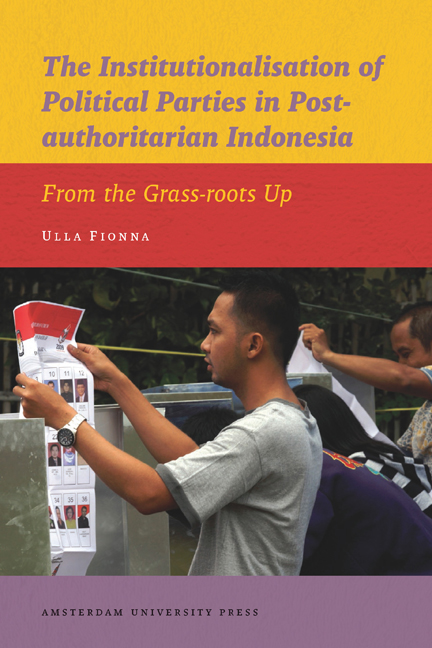 The Institutionalisation of Political Parties in Post-authoritarian Indonesia
The Institutionalisation of Political Parties in Post-authoritarian Indonesia Book contents
- Frontmatter
- Dedication
- Contents
- Preface
- Acknowledgements
- 1 The Question of Institutionalisation
- 2 Genesis of Modern Political Organisation in Indonesia
- 3 Diminishing Grass-roots Influence during the New Order
- 4 Party Organisation
- 5 Party Activities
- 6 Recruitment Approaches
- 7 Members’ Motivations and Participation in the Parties
- 8 Party Career and Intra-party Democracy
- 9 Progress of Party Institutionalisation and Its Role in Indonesia’s Democratisation
- Glossary
- Notes
- Bibliography
- Index
- Miscellaneous Endmatter
- Frontmatter
- Dedication
- Contents
- Preface
- Acknowledgements
- 1 The Question of Institutionalisation
- 2 Genesis of Modern Political Organisation in Indonesia
- 3 Diminishing Grass-roots Influence during the New Order
- 4 Party Organisation
- 5 Party Activities
- 6 Recruitment Approaches
- 7 Members’ Motivations and Participation in the Parties
- 8 Party Career and Intra-party Democracy
- 9 Progress of Party Institutionalisation and Its Role in Indonesia’s Democratisation
- Glossary
- Notes
- Bibliography
- Index
- Miscellaneous Endmatter
Summary
Like Indonesian political parties generally, Partai Golkar, Partai Demokrasi Indonesia Perjuangan, Partai Amanat Nasional and Partai Keadilan Sejahtera all have a strong preference for organising socio-cultural activities, mainly to attract as much attention and participation as possible. Party age has little to do with the capacity to organise these and other activities. Rather, it is the commitment and dedication found in a particular branch to organise activities that makes the difference. Young parties have proven just as able as the older parties to be active and creative in managing activities. But both the priorities and capacities of the parties vary, and reflect the level of party organisation. Betterorganised parties organise more activities compared with the less-organised ones.
Importance of Party Activities
Parties demonstrate their organisational abilities in part through routine and frequent events for their members. Ideally, these events occur in branch offices as well as in the parties’ central offices, since institutionalised parties are present at both local and national levels. Also, local branches must be active so that their presence is felt by the local population. Party activities are the simplest way for a party to promote itself. Through its activities, a party can advertise itself, its interests and its platform to the general public. However, parties must do more than just organise activities that appeal to the community. To be truly effective at the branch level, they must have routine intra-party procedures such as meetings (Mainwaring & Scully 1995). Members should be able to predict and expect what their party does, so that it will be easy for them to participate in party activities.
In studies of political parties, the term ‘activity’ is used to measure how much parties do, particularly after elections (see, for example, Fisher et al. 2006). Blondel (1978: 107) argues that party activities mainly concern the application of party policies. Ideal parties, he asserts, have clear ideologies which are promoted through the frequent and routine execution of their activities. Blondel posits that ideal party programmes should ‘aim to achieve [a] good or just society’, be consistent and be able to ‘implement party goals through detailed policies’. Like Mainwaring & Scully (1995), Blondel emphasises the routine execution of activities, but the main feature of his argument is his focus on the impact of different ideologies on the implementation of parties’ programmes (1978: chapter 6).
- Type
- Chapter
- Information
- The Institutionalisation of Political Parties in Post-authoritarian IndonesiaFrom the Grass-roots Up, pp. 95 - 116Publisher: Amsterdam University PressPrint publication year: 2013


